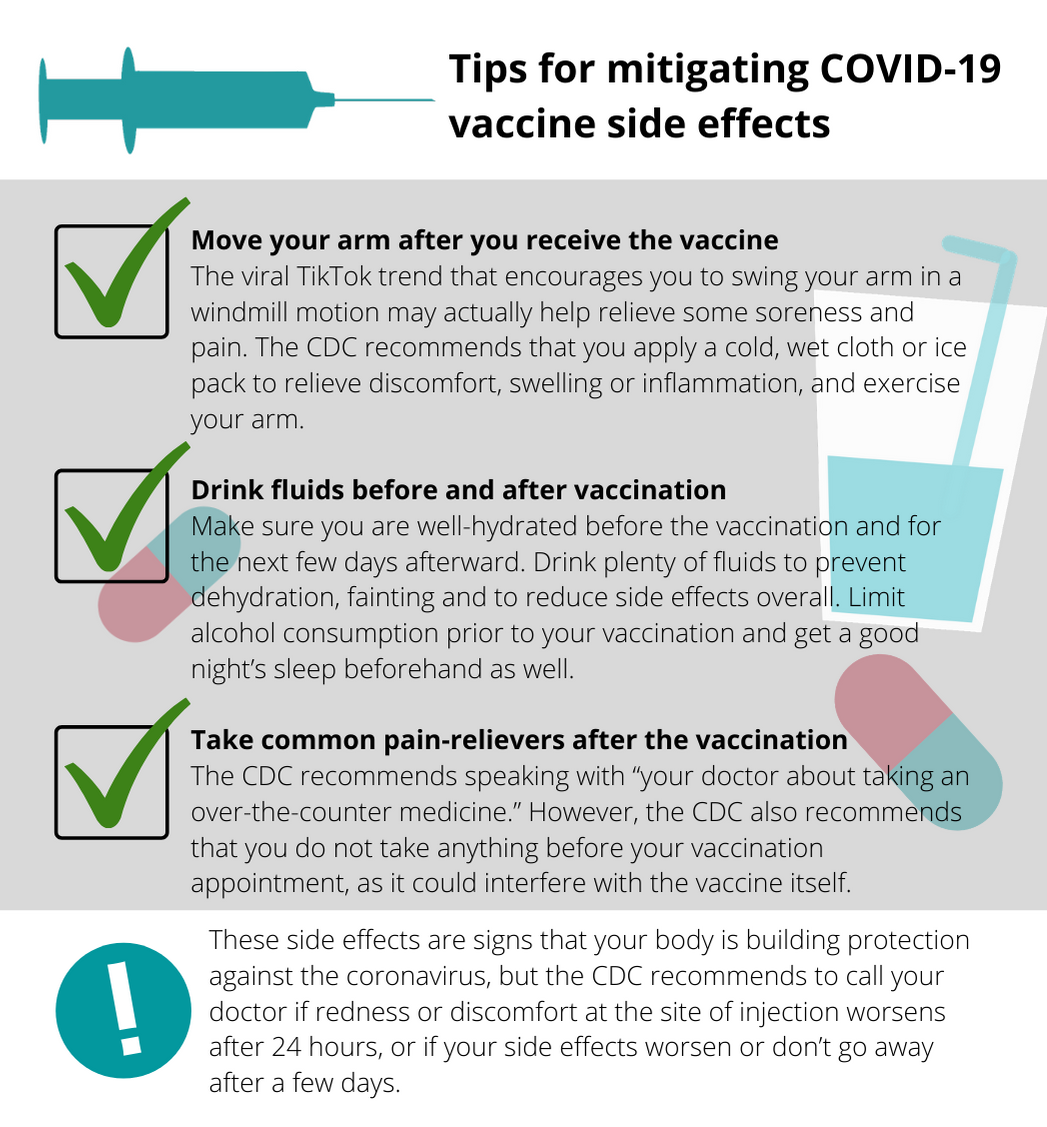Headache, chills, fever, fatigue—these are several of the common side effects people have reported after getting the second dose of the COVID-19 vaccine.
Currently, the U.S. Food and Drug Administration (FDA) has authorized three different vaccines in the U.S. for COVID-19. Two of the vaccines, Pfizer-BioNTech and Moderna, require two doses in order for people to become fully vaccinated, while the other vaccine, Johnson & Johnson, requires only one dose.
On April 13, the FDA and Centers for Disease Control and Prevention (CDC) put the Johnson & Johnson vaccine on hold because the safety systems that make sure vaccines are safe received a small number of reports of a rare and severe type of blood clot happening in people who got this vaccine. All reports occurred among women between the ages of 18 and 48, and symptoms occurred six to 13 days after vaccination, according to the CDC’s website. Health officials are investigating whether this health issue is related to or caused by the vaccine.
Vaccines work by training and preparing the body’s natural defenses to recognize and fight off the viruses and bacteria the immune system targets. After vaccination, if the body is later exposed to those disease-causing germs, the body is primed to destroy them, preventing illness.
“It’s normal for your body to mount to an immune response,” said Jamie Richardson, R.N., nurse navigator at the UNC Lineberger Comprehensive Cancer Center at the University of North Carolina at Chapel Hill.
Most people can expect to experience some mild discomfort following a vaccine. This means the vaccine is working and creating an immune response in the body.
“At the first dose, your body is seeing the antigen that it has to make an antibody against, so it takes time to ramp up,” Richardson said. “When you get the second dose, your body’s like, ‘Oh, I’ve seen that before, I’m going to fight it.’”
Getting a COVID-19 vaccine is a lot like getting any other shot, along with the side effects that come with it, Richardson said.
“The most common reactions are injection site reactions such as pain, swelling and redness at the site, and then some patients can go on to have things like a headache, fatigue, muscle aches and a fever,” Richardson said.
Peter Melniczek ’22, received both doses of the Moderna vaccine. The first shot only left him feeling tired, but with the second shot, he felt awful.
“I got a fever and extreme chills, the worst kind I ever had before,” Melniczek said. “I was also nauseous, which went on for about two days, and I couldn’t really eat, either.”
Emma Heffner ’23 received the Pfizer vaccine. The first dose made her tired and her arm was sore at the injection site. As with Melniczek, the second shot hit Heffner harder.
“The second dose was definitely 100 times worse,” Heffner said. “I felt like I got hit by a bus. I had aches all over my body and had the worst headache of my life, which lasted for an entire day.”
Heffner said she “chugged water” and took ibuprofen to help get through those symptoms.
Taking ibuprofen, acetaminophen, aspirin or antihistamines after a vaccine to relieve pain and discomfort should be fine as long your doctor okays it, according to Dr. Brett C. Gilbert, FACOI at Delaware Valley I.D. Associates, a medical practice in Wynnewood that specializes in infectious diseases and travel medicine. But taking those medications before getting a vaccine is not advised, he said.
“It is not recommended you take over-the-counter pain relievers PRIOR to getting vaccinated,” Gilbert wrote in response to written questions from The Hawk. “Theoretically, it could pose a risk of decreasing one’s immune response to the vaccine.”
Gilbert said there are other steps people can take to help mitigate symptoms.
“It is recommended that you are well hydrated, have had a good night’s sleep, have limited alcohol consumption prior to being vaccinated and have appropriately taken any medications you need on a routine basis for chronic conditions/illnesses,” Gilbert said. “Keep in mind, common side effects to the COVID-19 vaccine such as tiredness, headache, muscle pain, chills, fever and/or nausea are normal signs that your body is building protection.”
According to the CDC, side effects of the COVID-19 vaccine vary for each individual.
“Really it has to do with the strength of your own body’s immune response to the vaccine,” said Jennifer Kurasz, graduate student in microbiology at the University of Georgia. “Some people just experience a stronger immune response, so their own immune system is basically just freaking out a bit more than other people’s.”
Danielle Greenberg ’22 received both doses of the Pfizer vaccine and experienced very few side effects.
“After the first shot, my arm was just sore, and I definitely felt tired and fatigued, but I was really surprised after the second shot because I didn’t have any side effects besides feeling a bit tired,” Greenberg said.
That worked out well for Greenberg.
“I actually had to go to work right after my first and second shot, so I bought an extra large coffee to help with the tiredness,” Greenberg said.
Raeghan Smith ’21 received the Moderna vaccine and felt fine after the first dose but experienced “the kind of fatigue where your whole body kind of hurts” after the second dose.
Although Smith did not feel well, she said she was happy to get the vaccine.
“I was really grateful because I work at the Kinney Center, so they told us to get it as soon as possible,” said Smith, who works as a Kinney SCHOLAR. “So anything to make myself safer and to keep a better environment for everyone around me.”














































